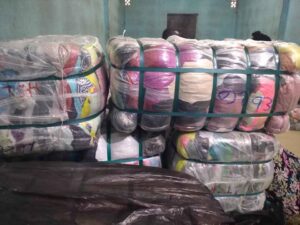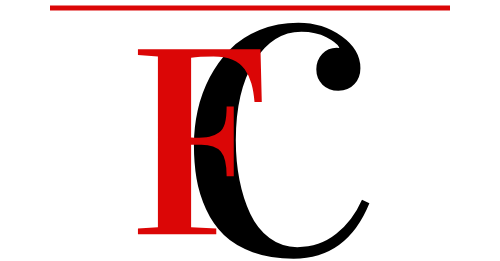There are three essential needs of man in life, which are food, shelter, and clothing.
A bale business, also known as an Okirika business or bend down select business in Nigeria, is a local name business used by Nigerians for secondhand or fairly used clothing.
Secondhand clothing can include pants, shirts, bags, shoes, electronics, trousers, belts, and a variety of other items. A bend down a business or an Okirika wears any old clothes.
How Much Is Okrika Bale In Nigeria?
The cost of each bale ranges from Naira 90,000 to Naira 200,000.
How Many Clothes are in One used Clothing Bale?
The quantity of clothing found in a bale cannot be defined. Weight is used to pack each bale. The weight of a bale varies based on the country of origin. Bales from Germany and the United Kingdom weigh 55kg, whereas bales from China weigh 100kg.
A 55kg bale will typically contain 350-400 pieces of clothing. Expect to discover twice as much clothing in a 100kg bale as you would in a 55kg bale. As you can see, there are no details on the numbers. The deciding component is weight.
How Much Money Can You Make Selling “Pretty used Garments in Bales”?
Depending on your ability level, there is a lot of money to be made in this business. A beginner should aim for 10% to 60% turnover, whilst an expert can double his capital in a single transaction. However, as a newbie, you should avoid pushing your luck too much. Play it safe and aim for a healthy profit margin.
How Much Is A 100kg Bale Of First Grade Okrika?
The price cannot be defined because there are several elements that influence pricing. The price ranges from 90,000 to 200,000 Naira, depending on the quality of the bale and the type of clothes in the bale.
Children Cotton Romage (CCR), Men Shirt (MCSH), Children Polo (CHP), Ladies Cotton Dress (LCD), Boys Cotton Shirt (BCS), Men’s Cotton Pant (MCP), Ladies Bum Short (Sex Short), Men Underwear (M Under), Ladies Three Quarter (L3/4), Ladies Chiffon Dress (LSD), Ladies T-Shirt (LTS), and so on are some of the clothing categories. The type of clothing so influences the price, but the price should remain within the range I previously indicated.
Where To Buy Thrift Clothes In Bulk In Nigeria?
Arena Warehouse in Oshodi is a great place to shop. Go to the W block of the Nigerian Army Shopping Arena in Oshodi. The area is restricted to Okrika bale vendors alone.
Where and from whom may one purchase? You can buy from us! Apy’s Couture is one of the best okrika bales suppliers in Lagos
Other locations in Lagos where you can get Okrika bales are as follows:
- Alaba International market
- Abule Egba Kotangowa Market
- Market in Badagry
- Tejuosho marketplace
- Yaba
- E-commerce sites such as Amazon and Aliexpress.
ALSO SEE: How Much Is A Bale Of Fabric In Nigeria?
Where To Buy Bale Of Fabric In Lagos?
Arena Warehouse in Oshodi is a great place to shop. Go to the W block of the Nigerian Army Shopping Arena in Oshodi. The area is restricted to Okrika bale vendors alone.
Where and from whom may one purchase? You can buy from us! Apy’s Couture is one of the best okrika bales suppliers in Lagos
Other locations in Lagos where you can get Okrika bales are as follows:
- Alaba International market
- Abule Egba Kotangowa Market
- Market in Badagry
- Tejuosho marketplace
- Yaba
- E-commerce sites such as Amazon and Aliexpress.
Price List 50kg Bale Of Clothes
The price ranges from 90,000 to 200,000 Naira, depending on the quality of the bale and the type of clothes in the bale.

How Much Is A Bale Of Jeans In Nigeria?
The price ranges from 90,000 to 200,000 Naira, depending on the quality of the bale and the type of jeans in the bale.
How Much Does A Bale Of Clothes Cost?
The price ranges from 90,000 to 200,000 Naira, depending on the quality of the bale and the type of clothes in the bale.
Where To Buy Bale Of Fabrics In Nigeria
Lagos, Abuja, and Kaduna
How Much Is A Bale Of Used Clothes In Nigeria?
The price ranges from 90,000 to 200,000 Naira, depending on the quality of the bale and the type of clothes in the bale.
Types of Akube Clothes in Nigeria
There are two types of Bend Down Select Business initiatives in Nigeria.
They are AA and AB-grade clothing, respectively. The AA grade wears are considered super grades since they have excellent quality and are usually outrageous, but the AB grade wears are a combination of super grades (AA Grade) and other kinds of grades. When compared to other grades, AB Grade garments are typically less expensive. And depending on how much one possesses, the price of each bale ranges from #50,000 to #150,000.
Benefits of Second-Hand Clothes In Nigeria
A bend-down business has various potential benefits for individuals who embark on this form of business in Nigeria. Among its numerous advantages are the following:
It is very inexpensive: Bend-down business is regarded as one of the most profitable business ideas one can readily engage in due to the great demand for this form of business.
Eventually, people do not always want to spend much on anything now given the state of the country’s economy; yet, even when shopping with the least amount of money, they want to receive the best quality for their money, which follows the old adage that high demand follows a lower price.
Almost everyone is now opting for gently worn clothing because of its appearance, affordability, and low cost.
-
Mobility and Popularity
An Okirika business is currently trending, with many profits generated as a result of the popularity of Nigerian citizens, and the business can also be conveniently transacted online.
-
To Appear Well
Nowadays, the lower and medium classes like displaying their clothes just as much as the upper and prominent classes do; this is highly popular among Nigerian adolescents, particularly female youths because fashion is the order of the day.
Through the emergence of Bend Down moderately used wear, youths have been given the opportunity to put on a stunning designer outfit at an inexpensive price, which is one of the reasons why the industry is deemed lucrative.
-
Durability
When compared to new Okirika garments, worn ones last longer. The fairly-used garments these days, without mincing words, last significantly longer than the new ones, which is based on popular belief. And, as a result of this widespread conviction, it has contributed to the creation of more markets for it, so increasing its profitability.
-
It requires a small investment.
The bale industry in Nigeria does not require a large amount of capital to get started, unlike other business endeavors that demand millions or even billions of dollars to get started. One can start a Bend Down Business with a minimal capital of fifty thousand nairas and generate a lot of money from it.
-
Fabrics that are one-of-a-kind
An Okirika properly used apparel is distinguished by special or unique textiles, which is one of the primary reasons why this bale company is currently trending and providing sufficient marketplaces. Young people, particularly females, are always looking for methods to stand out in terms of fashion trends.
They do not want to see anyone competing with them by wearing their own color of fabrics wherever and at any time. And the fairy utilized wear, also known as Bend Down wears, provides that type of cloth because its materials are always distinctive and special.
In contrast to new ones, which are always mass-produced in the same color and style.
Still, How Much Is A Bale Of Used Clothes In Nigeria? Anywhere from N90,000 to N200,000.
Factors to Consider before Looking for Where To Get First Grade Okrika Bale In Lagos & Making a Business out of It
A business plan is a plan that states the company’s market analysis, financial projections, executive summary, product or service line, business description, marketing and sales, and organization management, and the market analysis has to be properly written as part of the feasibility studies, which literally implies a well-summarized analysis on how to kick-start any business venture in order to be successful within an estimated cost when it is completed.
Given the multiple benefits of the Bend Down Industry in Nigeria as previously described, each aspiring entrepreneur must complete his or her homework in terms of analysis and research before getting into the business appropriately.
Before deciding how much a bale of secondhand garments costs in Nigeria, consider the following criteria.
-
Capital
Before starting a bale business, a capital or fund must be set up. The amount of capital set aside will determine whether the business will operate on a large or small scale.
Because this bale company normally involves a little capital with significant profits, it can quickly expand into a big business endeavor over time.
-
Capital for Business
When starting a new business, one of the most significant factors to consider is the location. In order to generate a profit in this type of business, intending entrepreneurs must consider foot traffic due to its business and crowdedness.
-
Find a Supplier
Before entering the Okirika industry, a dependable supplier must be evaluated. In Nigeria, there are two possibilities for finding a dependable supplier for a bale business.
One option is to order it through e-commerce sites such as Amazon, Alibaba, eBay, and others. Or it could be through meeting with that giant supplier who has created a name for himself or herself in Nigeria and buys their items from outside the country yet resides in Nigeria.
-
Targeted Customers
A prospective entrepreneur should primarily target young people because there is always a market for it. The bale business must examine entrepreneurs must evaluate this aspect very carefully in order to profit from the business.
-
Packaging
Prospective entrepreneurs must evaluate the packaging of Okirika clothing in order to benefit. When used items are well-wrapped, they can be easily sold as new. Washing, ironing, and neatly wrapping the garments with a lovely perfume are all part of the packaging process.
The secondhand clothing company is a very profitable one that anyone in Nigeria can easily start and profit from. It is a highly profitable business since it is simple to establish and coordinate, involves little cash, is in high demand, and requires little technical experience.

Leave a Reply